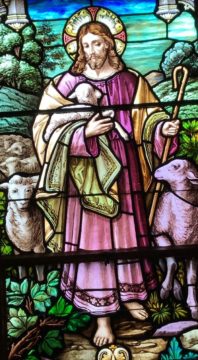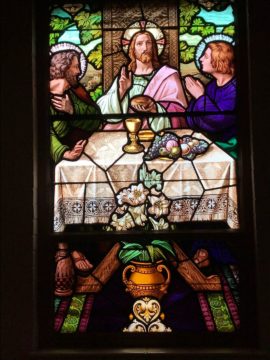On this day that our Church typically remembers St. Clare and her witness of a holy life, we look to the Sunday Gospel for insight. We offer a Franciscan Gospel reflection and questions written by Fr. Paul Gallagher, OFM for your prayer. They are edited by Franciscan Sister of Christian Charity Sister Anne Marie Lom and Joe Thiel. The excerpts from the Sunday readings are prepared by Joe Thiel. To read or download the complete pdf with excerpts for your prayer, please click here: Franciscan Gospel Reflection August 11 2019. Excerpts are from the Lectionary for Mass for Use in the Dioceses of the United States of America, second typical edition © 2001, 1998, 1997, 1986, 1970 Confraternity of Christian Doctrine, Inc., Washington, DC. Used with permission. All rights reserved. No portion of this text may be reproduced by any means without permission in writing from the copyright owner. Photos: St. Nicholas Church, Valentine, Nebraska (photographer Sister Mary Beth Kornely)
Luke 12:32-48 or 12:35-40 (The short form omits the italicized text.)
Jesus said to his disciples: “Do not be afraid any longer, little flock, for your Father is pleased to give you the kingdom. Sell your belongings and give alms. Provide moneybags for yourselves that do not wear out, an inexhaustible treasure in heaven that no thief can reach nor moth destroy. For where your treasure is, there also will your heart be.
“Gird your loins and light your lamps and be like servants who await their master’s return from a wedding, ready to open immediately when he comes and knocks. Blessed are those servants whom the master finds vigilant on his arrival. Amen, I say to you, he will gird himself, have them recline at table, and proceed to wait on them. And should he come in the second or third watch and find them preparing in this way, blessed are those servants. “Be sure of this much; if the master of the house had known the hour when the thief was coming, he would not have let his house be broken into. You also must be prepared, for at an hour you do not expect, the Son of Man will come.
Then Peter said, “Lord, is this parable meant for us or for everyone?” And the Lord replied, “Who, then is the faithful and prudent steward whom the master will put in charge of his servants to distribute the food allowance at the proper time? Blessed is that servant whom his master, on arrival, finds doing so. Truly, I say to you, the master will put the servant in charge of his property. But if that servant says to himself, ‘My master is delayed in coming,’ and comes to beat the menservants and the maidservants, to eat and drink and get drunk, then the servant’s master will come on an unexpected day and at an unknown hour and will punish the servant severely and assign him a place with the unfaithful. “That servant who knows his master’s will but does not make preparations nor act in accord with his will shall be beaten severely; and the servant who was ignorant of his master’s will but acted in a way deserving of a severe beating shall be beaten only lightly. Much will be required of the person entrusted with much, and still more will be demanded of the person entrusted with more.”
Background:
Last Sunday’s gospel text focused on the concern for worldly possessions. At the beginning of that text, a man asked Jesus to intervene with his brother so he could have his portion of the family property. Responding to this request, Jesus told the parable of the foolish farmer whose life decisions were based on the abundant harvest, not on the values of God. As Luke’s gospel continues beyond last Sunday’s text, Jesus draws on nature, i.e. the ravens and the flowers, to demonstrate how God cares for creation without need to worry about the future. The text for this week follows, and the opening verses continue with the theme of trusting in God’s providence.
Luke’s gospel was written about 50 years after the death of Jesus. The Christian community had been waiting for Jesus’ return much longer than they had originally expected. While the first line in the text for this Sunday relates back to last Sunday’s concern about possessions, the major portion of the text focuses on the disciples’ being prepared for Jesus’ return.
In the early years, the Christians waited for the return of Jesus much like the Jews waited on that first Passover night. Their yearly celebration of Passover became the basis for their understanding of how they were to wait for Jesus’ return in fullness of glory. Verses 35-40 of today’s gospel echo that sense of being ready for the moment when Jesus would appear.
Peter asks Jesus for whom he was telling this parable of servants waiting for their master’s return. Jesus does not answer Peter’s question, but takes the opportunity to emphasize the disciples’ responsibility as stewards of Jesus’ teaching.
Luke’s community would have seen themselves in the image of the slave (translated here “servant”). They are not slaves in the traditional sense of doing only what they are told without responsibility for the outcome. But as slaves of God, they must act with compassion and must be mindful of the well-being of themselves and others.
Jesus asks his disciples to act in a way that would be very different from their contemporaries. They are to look to the future for their reward. Most people in Luke’s community lived a day-to-day existence. There was no time to worry about the future. The Pharisees and the elite lived in a world that focused on the past, to maintain some sense of stability. Jesus is asking his disciples to live with watchfulness and a sense of fidelity that was uncommon in the day. His disciples must live out of a new kind of mindset and look to the future of God’s kingdom for their reward. Equally uncharacteristic is the master who would return from being away and gather the servants and begin to wait on them. While Jesus is asking for behavior that would set his disciples apart from the typical way of thinking, he is also promising them an extraordinary response from God.
Reflection questions:
1. Can you recall times when you were living in the present without time to think about the future? (i.e. sudden family illness, the premature birth of a child, combat, or intense academic studies.) Do you remember how different it was to live from day to day?
2. Recall a time when you were waiting for the return of or a visit from a person that you missed very much. What was that waiting like?
3. Recall a time when you were expecting the return of or a visit from a person you did not like. What was the quality of that waiting?
4. When I think of myself waiting, the images and feelings that come to mind are…
5. As Jesus describes the roles of the servant and the master, what lines stand out to you?
6. Can you take some time now to talk with God about how God want his disciples to live waiting for his return, or about your own efforts to live your life as a disciple in our society, or about some other concern that arose in you from this gospel?




